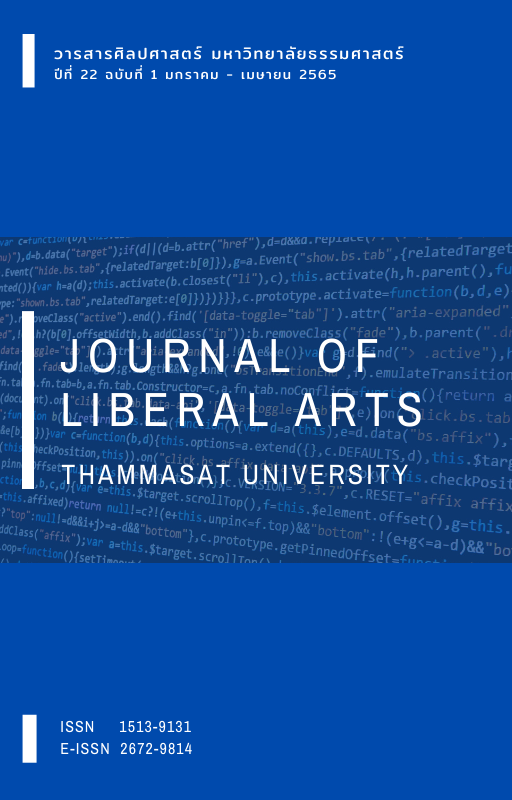คำแถลงท้ายเล่ม
Main Article Content
บทคัดย่อ
-
Downloads
Article Details

อนุญาตภายใต้เงื่อนไข Creative Commons Attribution-NonCommercial-NoDerivatives 4.0 International License.
เอกสารอ้างอิง
Ambrose, S. A., Bridges, M. W., DiPietro, M., Lovett, M. C., & Norman, M. K. (2010). How learning works: Seven research-based principles for smart teaching. Jossey-Bass.
Bass, R. (2017). Writing transfer and the future of the integrated university. In J. L. Moore & R. Bass (Eds.), Understanding writing transfer: Implications for transformative student learning in higher education (pp. 144-154). Stylus.
Chin, M. (2020, October 22). An ed-tech specialist spoke out about remote testing software—and now he’s being sued. The Verge. https://www.theverge.com/2020/10/22/21526792/proctorio-online-test-proctoring-lawsuit-universities-students-coronavirus
Cole, M., & Engestrom, Y. (1993). A cultural-historical approach to distributed cognition. In G. Salomon (Ed.), Distributed cognitions: Psychological and educational considerations (pp. 1-46). Cambridge University Press.
Engeström, Y. (1999). Communication, discourse, and activity. The Communication Review, 3(1-2), 165-185.
Feathers, T. (2020, October 21). An exam surveillance company is trying to silence critics with lawsuits. Vice. https://www.vice.com/en/article/7k9zjy/an-exam-surveillance-company-is-trying-to-silence-critics-with-lawsuits
Hu, J. (2020, October 26). Online test proctoring claims to prevent cheating: But at what cost?. Slate. https://slate.com/technology/2020/10/online-proctoring-proctoru-proctorio-cheating-research.amp?__twitter_impression=true
Kezar, A. (2018). How colleges change: Understanding, leading, and enacting change. Routledge.
Meyer, J. H. F., & Land, R. (2003) Threshold concepts and troublesome knowledge: linkages to ways of thinking and practicing. In C. Rust (Ed.), Improving student learning: theory and practice ten years on (pp. 412-424). Oxford Center for Staff and Learning Development.
Meyer, J. H. F., & Land, R. (2006). Overcoming barriers to student understanding: threshold concepts and troublesome knowledge. Routledge/Taylor and Francis.
O'Neil, C. (2016). Weapons of math destruction: How big data increases inequality and threatens democracy. Crown.
Patil, A., & Bromwich, J. E. (2020, September 29). How it feels when software watches you take tests. The New York Times. https://www.nytimes.com/2020/09/29/style/testing-schools-proctorio.html
Supiano, B. (2020, October 21). Students cheat. How much does it matter?. The Chronicle of Higher Education. https://www.chronicle.com/article/students-cheat-how-much-does-it-matter?utm_source=Iterable&utm_medium=email&utm_campaign=campaign_1641950_nl_Academe-Today_date_20201022&cid=at&source=ams&sourceId=2772313
Stoler, T. (2018, April 1). Academic plagiarism detection startup raises $1.1 million. CTech. https://www.calcalistech.com/ctech/articles/0,7340,L-3735323,00.html
Swauger, S. (2020, April 2). Our bodies encoded: Algorithmic test proctoring in higher education. Hybrid Pedagogy. https://hybridpedagogy.org/our-bodies-encoded-algorithmic-test-proctoring-in-higher-education/
Swauger, S. (2020, August 7). Software that monitors students during tests perpetuates inequality and violates their privacy. MIT Technology Review. https://www.technologyreview.com/2020/08/07/1006132/software-algorithms-proctoring-online-tests-ai-ethics/
Wardle, E. (2004). Can cross-disciplinary links help us teach "academic discourse" in FYC?. Across the Disciplines, 1. https://doi.org/10.37514/ATD-J.2004.1.1.06
Wardle, E., & Shanga, N. (2020). The time for small ideas is over [Web blog message]. Inside Higher Ed. https://www.insidehighered.com/blogs/just-visiting/guest-post-time-small-ideas-over
Watters, A. (2020). School work and surveillance. The New York Times. https://www.nytimes.com/2020/09/29/style/testing-schools-proctorio.html


